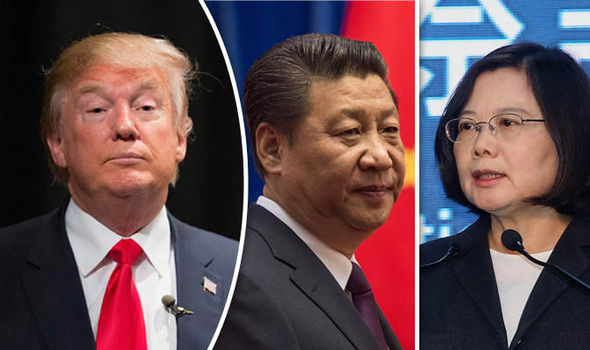By Tiberiu Dianu
Taiwan-mainland China relations (also known as Cross-Strait relations) have been always complex and controversial. As Hong Kong unrest and China trade ties dominate the news, how the US is dealing with Taiwan is worth a close look, too, given president Donald Trump’s muscular stance with China. And the news is good.
In 1949, as a result of a civil war, China was split into two entities: mainland China (People’s Republic of China/PRC) and Taiwan (Republic of China/ROC). The civil war merely stopped without the formal signing of any peace treaty and the two sides are technically still in a state of war. Since then, relations between Beijing and Taipei have been characterized by limited contact, tension, and instability.

During the years, communist China has used its traditional “panda diplomacy” with Taiwan (offering panda bears as gifts). The gifts of pandas were attempts by the administration in Beijing to draw the Taiwanese government into its “united front” even though the administrations in Taipei has often supported Taiwanese independence and opposed unification with the People’s Republic of China.
By comparing Taiwan to China in international policy, the idea of underdog comes naturally in our mind. But in American culture, underdogs are highly regarded. They appear in the Judeo-Christian parable of David and Goliath, and also reflect the ideal behind the American dream, where the poor and weak can use hard work to achieve victory.
That is why the Taiwan-United States relations have always been strong and durable, in spite of some ups and downs.
In 1979, during the Democratic administration (1977-1981) of president Jimmy Carter, the United States normalized diplomatic relations with the Beijing government under the Communist Party of China. Under the Taiwan Relations Act of 1979, the Taiwan-United State relations became unofficial and informal.
In 1982, during the Republican administration (1981-1989) of president Ronald Reagan, the United States -Taiwan relations were further informally grounded in the six assurances in response to the third communiqué on the establishment of US – PRC relations. The assurances were intended to reassure both Taiwan and the United States Congress that the United States would continue to support Taiwan even if it had earlier cut formal diplomatic relations.
President Trump took rapid steps to make the US relations with Taiwan even more robust, starting before his January 2017 presidential inauguration. On December 2, 2016, president-elect Trump accepted a congratulatory call from Taiwanese president Tsai Ing-Wen, which was the first time since 1979 that a president-elect has publicly spoken to a leader of Taiwan. Trump stated the call was regarding “The close economic, political and security ties between Taiwan and the US.”
On March 16, 2018, president Trump signed the Taiwan Travel Act, under which relations between the United States and Taiwan have since maneuvered to an official and high-level basis.
In June 2018, a new $250 million compound for the American Institute in Taiwan was unveiled. The Chinese authorities considered this action as violation of “One China” policy statement and insisted the United States to stop any relations with Taiwan without the approbation of China.
On July 17, 2018, Taiwan’s Army was officially commissioned all of its Apache attack helicopters purchased from the United States, at cost of $1.94 billion, having completed the necessary pilot training and verification on the fleet’s combat capability.
Taiwanese president Tsai Ing-Wen said the commissioning of the Apaches was “an important milestone” in meeting the island’s “multiple deterrence” strategy to counter an invasion and to resist Beijing’s pressure with support from Washington, which has been concerned about Beijing’s growing military expansion in the South China Sea and beyond.
In September 2018, the United States approved the sale of $330 million worth of spare parts and other equipment to sustain the Taiwan Air Force.
In July 2019, the US State Department approved the sale of M1A2T Abrams tanks, Stinger missiles, and related equipment to Taiwan, at an approximate value of $2.2 billion.
More recently, the Trump administration, which China has been verbally attacking for weeks, now has plans to sell $8 billion worth of new F-16 fighter jets to Taiwan. The F-16V is the most advanced version of a plane that already forms the backbone of Taiwan’s air forces. Taiwan is expected to use the F-16V to replace the Northrop F-5E/Fs that are being retired in the next couple of years.
On August 16, 2019, the State Department submitted the package to Congress for informal review, and it is not expected to meet opposition.
It would be the largest and most significant sale of weaponry to Taiwan in decades. There is a mandatory 30-calendar day formal review process before the state can issue a letter of offer and acceptance to Taiwan for the sale. Taiwan is under increasing pressure from the People’s Republic of China, so the sale is critical to improving the country’s ability to defend its sovereign air space.
Also, the sale sends a strong message about the US commitment to security and democracy in the entire Indo-Pacific region. China is expected to vehemently object this last deal since China never likes US arms sales to Taiwan.
In May 2019, the Beijing communist regime already threatened to retaliate against the United States for limiting the federal dollars spent on Chinese products.
The People’s Daily, the Chinese Communist Party’s official journal, intimated that China would stop exporting “rare earth” minerals to the United States, writing: “Don’t say we didn’t warn you!”
That phrase has been historically used by the Chinese Communist Party to threaten armed warfare. The reply was not long in coming. On August 5, 2019, the US Treasury Department announced that it had declared China a currency manipulator.
Recently, according to a spokesman for the United States Pacific Fleet, China banned two US warships from visiting Hong Kong and accused members of Congress from both parties of being “the black hand” behind the protesters in Hong Kong rallying against the government of communist China.
Over the years tiny Taiwan has managed not only to survive but to give enough headaches to the behemoth which is China. What they say about “small leaks sink great ships” or “little strokes fell great oaks” applies perfectly to the Taiwan-China relationship.
It’s a sign that the Chinese “panda diplomacy” is not that infallible anymore.





